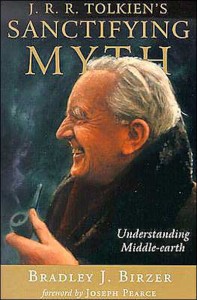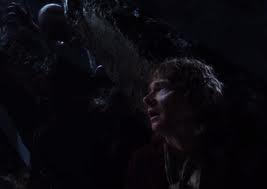Welcome to Week 3 of our Hobbit Read Along! If you’re just joining us (and it’s not too late!), you should probably check out the Introduction, Week 1 and Week 2 of the read along. You can find the full reading schedule in the download at the bottom of this page, but just fyi, we’re supposed to be around Chapter 7 of The Hobbit today. Or skip ahead to Week 4.
Hobbit Radio Theater Contest
Since next Monday, November 26th is the deadline to enter, I thought we’d take a moment to remind everyone of the radio theater contest. Even if you aren’t doing the read along, you’re still welcome to enter. Just record you or your child (or both!) reading a page or two of The Hobbit. (You can use this free audio recording software if you don’t already have some.) Be sure to try on your best Smaug or troll voices!
We’ll narrow the best down to three or four finalists, and then we’ll post them on our blog that week for readers to vote on. The winner will get one copy of a Hank the Cowdog audiobook, and a free caricature of a family member or friend as a Hobbit character.
HOT CHOCOLATE: the skinny version
 I went looking for a skinny hot chocolate recipe for you guys this week. And my goodness, did I find one! I’m not totally convinced it’s all that skinny, or that I will be when I get done with this sweet treat. But if you follow the directions and use diet hot chocolate mix, low-fat almond milk, and fat-free whipped cream, you’ll certainly loose a lot of calories without losing all the fun. Does this not look absolutely delicious?! You can check out the recipe on its home site, www.skinnysometimes.com, or just print it out below in the read along guide.
I went looking for a skinny hot chocolate recipe for you guys this week. And my goodness, did I find one! I’m not totally convinced it’s all that skinny, or that I will be when I get done with this sweet treat. But if you follow the directions and use diet hot chocolate mix, low-fat almond milk, and fat-free whipped cream, you’ll certainly loose a lot of calories without losing all the fun. Does this not look absolutely delicious?! You can check out the recipe on its home site, www.skinnysometimes.com, or just print it out below in the read along guide.
Finding God in Tolkien’s Heroes
As you may recall, last week we talked about how Tolkien’s bad guys pointed to God and His goodness. Hopefully you were as engrossed in the story as I was when Gollum made his appearance out of the darkness under the mountains. Such an amazing character, albeit quite scary and creepy!
 This week, I thought we would look at the heroes of Tolkien’s stories. Besides Jim Ware’s book aimed at families, which I link to below, I’ve also consulted one other book quite a lot on this subject this week: J.R.R. Tolkien’s Sanctifying Myth: Understanding Middle-Earth
This week, I thought we would look at the heroes of Tolkien’s stories. Besides Jim Ware’s book aimed at families, which I link to below, I’ve also consulted one other book quite a lot on this subject this week: J.R.R. Tolkien’s Sanctifying Myth: Understanding Middle-Earth by Bradley J. Birzer.
So, how do Tolkien’s heroes point to God? If you’re just here for the family read along, skip down to the podcast and study guide below. They’ll approach some of these topics in a more kid-friendly way. But if you’d like to go deeper, feel free to read what’s below!
- His Heroes are Humble: One of the main points of my discussion with Jim Ware below is the contrast between Tolkien’s heroes who are “reluctant leaders” and villains who relish power. Because we live in a fallen world, the need for heroes is paramount. But who is sufficient for the task? All of us are fallen, finite creatures. Bilbo, Frodo and Gandalf among others represent a Moses-type of leader who knows he is insufficient, and yet must lead because the calling has come to him. And notice it is an active humility. Unlike many people today who think of humility as subservience, in the Biblical accounting, humility is walking the road you are called to walk, whether or not you seem likely to succeed. And although Christ Himself was not burdened by sin as we are, even in humility He serves as our prime example: Philippians 2:5-8.
He knows that he isn’t up to the challenge of guiding the dwarves through the wilderness, delivering them from dangers, destroying the dragon, and liberating the treasure. That is a job for a wizard, not a furry-footed, yellow-waistcoated, middle-aged bachelor from the Shire! But the wizard is unavailable, and Bilbo has to do the best he can.–Jim Ware, Finding God in the Hobbit.
- His Heroes are Servants: Another great point Jim Ware makes in his book is that for the Christian, to be a leader is “not to be served, but to serve, and to give his life as a ransom for many.” Leadership will be painful, it will be costly, and he who would be first must be servant of all:
A true leader shies away from his calling because he knows there’s nothing in it for him. He understands that the perils, the anxieties, and the sleepless nights will be endured not for the sake of personal gain, but for the benefit of somebody else. In other words, he realizes that genuine leadership is a matter of service and self-sacrifice; and that’s always a bit uncomfortable.–Jim Ware, Finding God in the Hobbit.
- His Heroes Have a Fixed North Star: For all that Tolkien’s characters are tempted to do wrong and sacrifice their principles, the value of those principles are always firm and a man/elf/wizard is judged by his willingness to perform his duty, no matter the personal cost or cultural context. There are no “situational ethics” on a sliding scale for Tolkien. As Birzer puts it,
When one of the riders asks Aragorn how to discern right and wrong in complicated times, Aragorn responds: ‘As he has ever judged,’ for ‘good and ill have not changed since yesteryear; nor are they one thing among Elves and Dwarves and another among Men. It is a man’s part to discern them, as much in the Golden Wood as in his own house.” p. 67
The reason this is so, of course, is because there is one God who made them all, and His laws are written throughout the book of nature, including his creatures’ consciences. (FYI, God is actually in the stories, though He remains mostly in the background. He is named explicitly in The Silmarillion as Eru Ilúvatar if you’d like to read more about him.)
- Tolkien’s Heroes as Prophets, Priests, and Kings: One of the most interesting commentaries from Tolkien on his entire mythology explains that Gandalf, Frodo, and Aragorn together give a picture of the Biblical idea of leadership, encompassing prophet, priest and king. And as such, they are sanctified throughout their journeys. As Birzer quotes Tolkien’s, “m.-e. [Middle Earth] is saved through the priestly sacrifice of the hobbit Frodo, the wisdom and guidance of Gandalf and mastery of Aragorn, heir of kings. Also forces beyond these. As each agent responds to his ‘calling’ he grows in power and grace. Each becomes increasingly ‘Christian.’” (p. 70 Birzer)
- His Heroes Value Life and Beauty: While the evil characters like Orcs and Sauron love machines and have no value for things beyond their usefulness, from Beorn to the Dwarves to Bilbo himself, Tolkien’s heroes love living things more than machines. And because they do not value efficiency above all else (as many of Tolkien’s contemporaries), they love beauty and artistry as well. I’m not sure I totally agree with Tolkien’s dislike of machines en toto. I do so enjoy my warm shower in the morning. But I appreciate very much that his heroes value life and its expressions of beauty (whether blooming flowers or songs) over mere utilitarianism. How does this point to God? I am not exactly sure, but I’d hazard a guess that beauty and life, without God, has often seemed mere machinery to man (i.e. evolution). But as creations of God, life and beauty are intrinsically valuable because He made them and loves them, and through them displays His glory.
 His Heroes Value Justice and Mercy…and Happy Endings: “He has shown you, O man, what is good and what the Lord requires of you. But to do justly, and to love mercy, and to walk humbly with your God.” (Micah 6:8) As Christians, we are to be just: to pay what we owe to others quickly, give honor to whom honor is due, or mete out punishment to the guilty or protection to the innocent when our position demands it. On the other hand, we are also called to deal mercifully with those who owe us, forgiving them seventy seven times (beyond counting). While there are numerous places in Tolkien’s work where heroes pay what they owe or offer mercy, I can’t think of a better example that when Bilbo refuses to kill Gollum in Chapter 5 of The Hobbit. Both justice and mercy restrain his hand, and Tolkien has put that act right at the center of the story. Tolkien tells us that as Bilbo considers attacking Gollum, he can’t do it because it wouldn’t be a fair fight (unlike Gollum who had killed many orcs by sneaking up on them while invisible) and because he has sympathy for Gollum’s suffering. As Jim Ware puts it,
His Heroes Value Justice and Mercy…and Happy Endings: “He has shown you, O man, what is good and what the Lord requires of you. But to do justly, and to love mercy, and to walk humbly with your God.” (Micah 6:8) As Christians, we are to be just: to pay what we owe to others quickly, give honor to whom honor is due, or mete out punishment to the guilty or protection to the innocent when our position demands it. On the other hand, we are also called to deal mercifully with those who owe us, forgiving them seventy seven times (beyond counting). While there are numerous places in Tolkien’s work where heroes pay what they owe or offer mercy, I can’t think of a better example that when Bilbo refuses to kill Gollum in Chapter 5 of The Hobbit. Both justice and mercy restrain his hand, and Tolkien has put that act right at the center of the story. Tolkien tells us that as Bilbo considers attacking Gollum, he can’t do it because it wouldn’t be a fair fight (unlike Gollum who had killed many orcs by sneaking up on them while invisible) and because he has sympathy for Gollum’s suffering. As Jim Ware puts it,
“At the critical moment, a sudden insight into Gollum’s despondency and despair—a capacity to see matters from his point of view—fills the hobbit with an overwhelming sense of pity and stays his hand. In hindsight, it’s easy to see the positive long-range ramifications of Bilbo’s act of mercy. Ultimately, his compassion becomes the linchpin upon which the fate of Middle-earth turns. For Gollum is the one who, in the end, brings about the destruction of the One Ring…”–Jim Ware, Finding God in the Hobbit
And where is God here? Certainly, God’s sovereignty is at work. Remember Gandalf’s quote in Lord of the Rings, ‘There are other forces at work in this world Frodo, besides the will of evil. Bilbo was meant to find the Ring. In which case, you were also meant to have it….’ And that sovereignty extends even to Bilbo’s mercy on Gollum, which Gandalf defends to Frodo. And its that upward hope that causes them to look for the happy “eucatastrophe”–the sudden happy ending out of darkness:
“It was pity that stayed Bilbo’s hand. Many that live deserve death. Some that die deserve life. Can you give it to them, Frodo? Do not be too eager to deal out death in judgment. Even the very wise cannot see all ends. My heart tells me that Gollum has some part to play yet, for good or ill before this is over. The pity of Bilbo may rule the fate of many.”
Guest Host: Jim Ware, take 2
This week, Jim Ware is back to help your family think a few of the points above. Once again, we’ll be discussing his family-friendly book Finding God in The Hobbit. In case you’ve forgotten, Jim is a writer for Focus on the Family, and he’s written numerous books for kids and families including Adventures in Odyssey, God of the Fairy Tale: Finding Truth in the Land of Make-Believe, and of course the resource we’ll be consulting, Finding God in the The Hobbit. He also co-wrote Finding God in the Lord of the Rings
and Finding God in the Land of Narnia (Saltriver)
with Kurt Bruner. In addition, Jim has written his own fantasy series, The Stone of Destiny: A Novel
, which I only just found out about and hope to review before long.
THE PODCAST w/ Jim Ware
[powerpress] ***podcast currently unavailable***
HOBBIT READ ALONG GUIDE, WEEK TWO
These are the resources you may want to print off if you’re actually doing the read along. (I hope the rest of the post will be interesting for folks regardless.) It includes the read along schedule, the week’s main idea, games/discussion questions, the radio theater contest, and of course, the week’s hot chocolate recipe. Hope you enjoy!
CLICK HERE to download the guide as .pdf.
So are you guys enjoying the reading so far? Any big ah-ha moments or just memorable times you’d like to report? I’d love to hear how some of you are doing!
Support our writers and help keep Redeemed Reader ad-free by joining the Redeemed Reader Fellowship.
Stay Up to Date!
Get the information you need to make wise choices about books for your children and teens.
Our weekly newsletter includes our latest reviews, related links from around the web, a featured book list, book trivia, and more. We never sell your information. You may unsubscribe at any time.
We'd love to hear from you!
Our comments are now limited to our members (both Silver and Golden Key). Members, you just need to log in with your normal log-in credentials!
Not a member yet? You can join the Silver Key ($2.99/month) for a free 2-week trial. Cancel at any time. Find out more about membership here.



